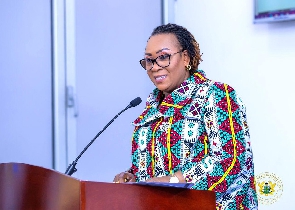Mavis Hawa Koomson, Minister for Fisheries and Aquaculture, has reiterated the Ministry’s commitment to ensuring the production of safe fish for consumption in Ghana.
She emphasised that fish was highly perishable and that once it was out of the water, fish mummies quickly transformed them into very stable forms such as smoking, sun drying and salting.
The Minister made the remarks at a National Workshop to disseminate a policy on the inclusion of fish into the Ghana School Feeding Programme and Nutrition Education materials organised by the Food and Agriculture Organisation (FAO).
Mrs Koomson said the Ministry had equipped women fish processors with high quality and food-safety fish processing technologies to safeguard consumption and meet international standards.
She said, “as we are aware, the small fish contains the necessary nutrients needed for the development of the body and also rich in omega-3 fatty acids which is good for brain function.”
The Minister said the small fish was the most abundant fisheries resources in the Ghanaian waters and would ensure the sustainability of the programme.
She expressed appreciation to the FAO for supporting the Ministry to implement the small-scale fisheries guidelines for gender equitable and climate resilient food systems and livelihoods.
She assured stakeholders that the Ministry would ensure that the necessary linkages were created to ensure the availability of fish to stakeholders in the school feeding programme at affordable price.
Mr Yaw Frimpong Addo, Deputy Minister in Charge of Crops, said nutrition was of a high significance in the growth and development of school children, and that it played a pivotal role in ensuring their physical and cognitive development.
“The inclusion of small fish into the school feeding programme will provide significant boost to the local fish industry and create a demand for small fish, thereby supporting local fishermen and fish processes,” he added.
Mr Addo called for unity and commitment to the well being of children and the sustainable development of nation.
Dr Yurdi Yasmi, Country Representative of FAO in Ghana, said millions of school children consumed foods during school hours, and that in many lower middle-income countries, a school meal constituted a significant part of their diet.
He said the school feeding programme since it’s inception in 2005 had seen progress, covering the 261 Metropolitan, Municipal and District Assemblies across the 16 Administrative Regions with 3.8 million beneficiary pupils in 11,000 schools.
He said a study was commissioned to analyse the role of small fish and small-scale fisheries value chains in livelihoods, diets and nutrition.
The Country Representative said the study examined the role of small fish in ensuring that the programme was sustainable and resilient as it related to the food and nutrition security of school going children in fishing communities.
The findings of the study had led to the development of technical papers, training manuals and policy briefs to advocate for the inclusion of small fish in the diets of school-aged children in Ghana.
Business News of Wednesday, 26 July 2023
Source: GNA













